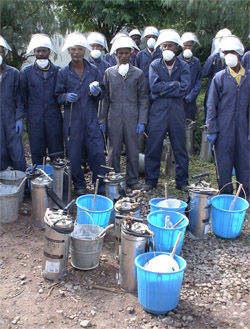During two months prior to the peak malaria transmission season, from July to August 2008, teams of sprayers entirely supported by PMI covered 302 villages until 316,829 household structures had been sprayed with insecticide.

USAID-trained spray operators are ready to work from house to house in the Dodota district in Ethiopia. Source: Richard Reithinger, USAID/Ethiopia
President’s Malaria Initiative provides support to help eliminate malaria in Ethiopia.
Hundreds of masked men and women in blue overalls have been swarming from one village to another and from one household to another, moving furniture and animals with only one thing on their mind: to spray the walls, ceilings and eaves of households with a long-lasting insecticide to kill one of Ethiopia’s biggest scourges: malaria mosquitoes.
Villagers welcomed the 1,152 USAID-trained men and women armed with spray pumps and insecticide as part of the U.S. President’s Malaria Initiative (PMI) activities in Ethiopia. The activity is part of a package of prevention and control interventions to significantly reduce the number of cases and fatalities due to malaria in the country.
“USAID’s support for the indoor residual spraying (IRS) program this year reminded me of the eradication era,” said Mr. Haile Gabre, Malaria Control Officer in Adami Tulu district. He added, “The program was first established in Ethiopia with financial and technical support from USAID in the 1960s. Back then provision of supplies, financial resources, training of health professionals on IRS and organization of the spray team and leadership was excellent. Great geographical coverage and effective spraying were key to the reduction of malaria burden in the country. Since 1979 financial resources and supplies declined, which heavily compromised the coverage and quality of spraying. Our communities were exposed and affected by frequent malaria epidemics, which caused an unacceptable loss of life.”
He thanked the United States “for coming back again to support this important program and bringing new life to it after long years of problems.” Now supplies are stocked and villages have been sprayed. “As a result, we do not anticipate seeing malaria epidemics in our district this year.”
During two months prior to the peak malaria transmission season, from July to August 2008, teams of sprayers entirely supported by PMI covered 302 villages until 316,829 household structures had been sprayed with insecticide. In addition, USAID procured and supplied 369,103.4 kg of insecticide that enabled the Ethiopian Government to spray 1,476,419 household structures. In total, 1.7 million homes were sprayed and 5.9 million people protected with support from U.S. Government funds.
